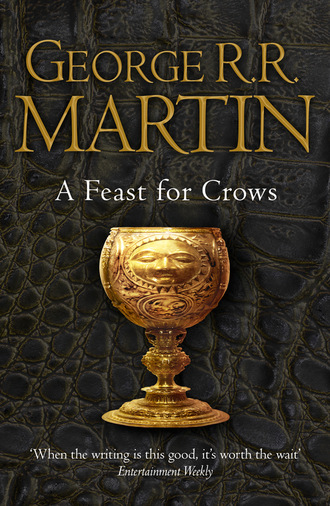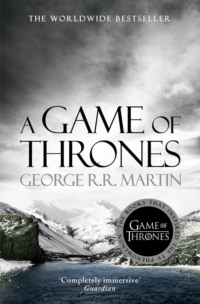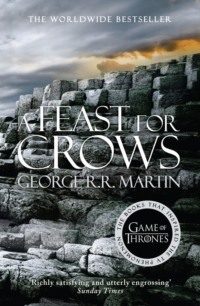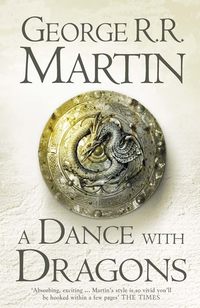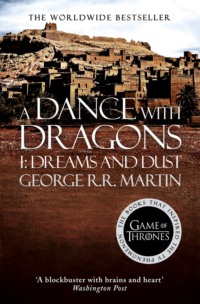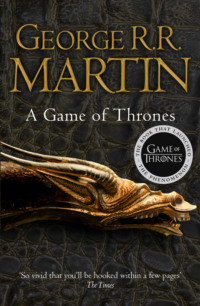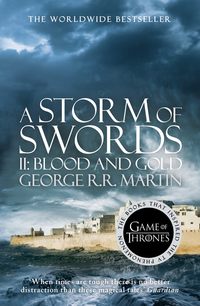The captain’s sister was not hard to find. The Seven Swords was the largest inn in town, a four-story structure that towered over its neighbors, and the double doors on the house across the way were painted gorgeously. They showed a castle in an autumn wood, the trees done up in shades of gold and russet. Ivy crawled up the trunks of ancient oaks, and even the acorns had been done with loving care. When Brienne peered more closely, she saw creatures in the foliage: a sly red fox, two sparrows on a branch, and behind those leaves the shadow of a boar.
“Your door is very pretty,” she told the dark-haired woman who answered when she knocked. “What castle is that meant to be?”
“All castles,” said the captain’s sister. “The only one I know is the Dun Fort by the harbor. I made t’other in my head, what a castle ought to look like. I never seen a dragon neither, nor a griffin, nor a unicorn.” She had a cheerful manner, but when Brienne showed her the shield her face went dark. “My old ma used to say that giant bats flew out from Harrenhal on moonless nights, to carry bad children to Mad Danelle for her cookpots. Sometimes I’d hear them scrabbling at the shutters.” She sucked her teeth a moment, thoughtful. “What goes in its place?”
The arms of Tarth were quartered rose and azure, and bore a yellow sun and crescent moon. But so long as men believed her to be a murderess, Brienne dare not carry them. “Your door reminded me of an old shield I once saw in my father’s armory.” She described the arms as best she could recall them.
The woman nodded. “I can paint it straightaway, but the paint will need to dry. Take a room at the Seven Swords, if it please you. I’ll bring the shield to you by morning.”
Brienne had not meant to overnight in Duskendale, but it might be for the best. She did not know if the lord of the castle was in residence, or whether he would consent to see her. She thanked the painter and crossed the cobblestones to the inn. Above its door, seven wooden swords swung beneath an iron spike. The whitewash that covered them was cracked and peeling, but Brienne knew their meaning. They stood for the seven sons of Darklyn who had worn the white cloaks of the Kingsguard. No other house in all the realm could claim as many. They were the glory of their House. And now they are a sign above an inn. She pushed into the common room and asked the innkeep for a room and a bath.
He put her on the second floor, and a woman with a liver-colored birthmark on her face brought up a wooden tub, and then the water, pail by pail. “Do any Darklyns remain in Duskendale?” Brienne asked as she climbed into the tub.
“Well, there’s Darkes, I’m one myself. My husband says I was Darke before we wed, and darker afterward.” She laughed. “Can’t throw a stone in Duskendale without you hit some Darke or Darkwood or Dargood, but the lordly Darklyns are all gone. Lord Denys was the last o’ them, the sweet young fool. Did you know the Darklyns were kings in Duskendale before the Andals come? You’d never know t’look at me, but I got me royal blood. Can you see it? ‘Your Grace, another cup of ale,’ I ought to make them say. ‘Your Grace, the chamber pot needs emptying, and fetch in some fresh faggots, Your Bloody Grace, the fire’s going out.’” She laughed again and shook the last drops from the pail. “Well, there you are. Is that water hot enough for you?”
“It will serve.” The water was lukewarm.
“I’d bring up more, but it’d just slop over. A girl the size o’ you, you fill a tub.”
Only a cramped small tub like this one. At Harrenhal the tubs had been huge, and made of stone. The bathhouse had been thick with the steam rising off the water, and Jaime had come walking through that mist naked as his name day, looking half a corpse and half a god. He climbed into the tub with me, she remembered, blushing. She seized a chunk of hard lye soap and scrubbed under her arms, trying to call up Renly’s face again.
By the time the water had gone cold, Brienne was as clean as she was like to get. She put on the same clothes she had taken off and girded her swordbelt tight around her hips, but her mail and helm she left behind, so as not to seem so threatening at the Dun Fort. It felt good to stretch her legs. The guards at the castle gates wore leather jacks with a badge that showed crossed warhammers upon a white saltire. “I would speak with your lord,” Brienne told them.
One laughed. “Best shout out loud, then.”
“Lord Rykker rode to Maidenpool with Randyll Tarly,” the other said. “He left Ser Rufus Leek as castellan, to look after Lady Rykker and the young ones.”
It was to Leek that they escorted her. Ser Rufus was a short, stout greybeard whose left leg ended in a stump. “You will forgive me if I do not rise,” he said. Brienne offered him her letter, but Leek could not read, so he sent her to the maester, a bald man with a freckled scalp and a stiff red mustache.
When he heard the name Hollard, the maester frowned with irritation. “How often must I sing this song?” Her face must have given her away. “Did you think you were the first to come seeking after Dontos? More like the twenty-first. The gold cloaks were here within days of the king’s murder, with Lord Tywin’s warrant. And what do you have, pray?”
Brienne showed him the letter, with Tommen’s seal and childish signature. The maester hmmmmed and hrrrred, picked at the wax, and finally gave it back. “It seems in order.” He climbed onto a stool and gestured Brienne to another. “I never knew Ser Dontos. He was a boy when he left Duskendale. The Hollards were a noble House once, ’tis true. You know their arms? Barry red and pink, with three golden crowns upon a blue chief. The Darklyns were petty kings during the Age of Heroes, and three took Hollard wives. Later their little realm was swallowed up by larger kingdoms, yet the Darklyns endured and the Hollards served them … aye, even in defiance. You know of that?”
“A little.” Her own maester used to say that it was the Defiance of Duskendale that had driven King Aerys mad.
“In Duskendale they love Lord Denys still, despite the woe he brought them. ’Tis Lady Serala that they blame, his Myrish wife. The Lace Serpent, she is called. If Lord Darklyn had only wed a Staunton or a Stokeworth … well, you know how smallfolk will go on. The Lace Serpent filled her husband’s ear with Myrish poison, they say, until Lord Denys rose against his king and took him captive. In the taking, his master-at-arms Ser Symon Hollard cut down Ser Gwayne Gaunt of the Kingsguard. For half a year, Aerys was held within these very walls, whilst the King’s Hand sat outside Duskendale with a mighty host. Lord Tywin had sufficient strength to storm the town any time he wished, but Lord Denys sent word that at the first sign of assault he’d kill the king.”
Brienne remembered what came next. “The king was rescued,” she said. “Barristan the Bold brought him out.”
“He did,” the maester said. “Once Lord Denys lost his hostage, he opened his gates and ended his defiance rather than let Lord Tywin take the town. He bent the knee and begged for mercy, but the king was not of a forgiving mind. Lord Denys lost his head, as did his brothers and his sister, uncles, cousins, all the lordly Darklyns. The Lace Serpent was burned alive, poor woman, though her tongue was torn out first, and her female parts, with which it was said that she had enslaved her lord. Half of Duskendale will still tell you that Aerys was too kind to her.”
“And the Hollards?”
“Attainted and destroyed,” said the maester. “I was forging my chain at the Citadel when this happened, but I have read the accounts of their trials and punishments. Ser Jon Hollard the Steward was wed to Lord Denys’s sister and died with his wife, as did their young son, who was half-Darklyn. Robin Hollard was a squire, and when the king was seized he danced around him and pulled his beard. He died upon the rack. Ser Symon Hollard was slain by Ser Barristan during the king’s escape. The Hollard lands were taken, their castle torn down, their villages put to the torch. As with the Darklyns, House Hollard was extinguished.”
“Save for Dontos.”
“True enough. Young Dontos was the son of Ser Steffon Hollard, the twin brother of Ser Symon, who had died of a fever some years before and had no part in the Defiance. Aerys would have taken the boy’s head off nonetheless, but Ser Barristan asked that his life be spared. The king could not refuse the man who’d saved him, so Dontos was taken to King’s Landing as a squire. To my knowledge he never returned to Duskendale, and why should he? He held no lands here, had neither kin nor castle. If Dontos and this northern girl helped murder our sweet king, it seems to me that they would want to put as many leagues as they could betwixt themselves and justice. Look for them in Oldtown, if you must, or across the narrow sea. Look for them in Dorne, or on the Wall. Look elsewhere.” He rose. “I hear my ravens calling. You will forgive me if I bid you good morrow.”
The walk back to the inn seemed longer than the walk to the Dun Fort, though perhaps that was only her mood. She would not find Sansa Stark in Duskendale, that seemed plain. If Ser Dontos had taken her to Oldtown or across the narrow sea, as the maester seemed to think, Brienne’s quest was hopeless. What was there for her in Oldtown? she asked herself. The maester never knew her, no more than he knew Hollard. She would not have gone to strangers.
In King’s Landing, Brienne had found one of Sansa’s former maids doing washing in a brothel. “I served with Lord Renly before m’lady Sansa, and both turned traitor,” the woman Brella complained bitterly. “No lord will touch me now, so I have to wash for whores.” But when Brienne asked about Sansa, she said, “I’ll tell you what I told Lord Tywin. That girl was always praying. She’d go to sept and light her candles like a proper lady, but near every night she went off to the godswood. She’s gone back north, she has. That’s where her gods are.”
The north was huge, though, and Brienne had no notion which of her father’s bannermen Sansa might have been most inclined to trust. Or would she seek her own blood instead? Though all of her siblings had been slain, Brienne knew that Sansa still had an uncle and a bastard half brother on the Wall, serving in the Night’s Watch. Another uncle, Edmure Tully, was a captive at the Twins, but his uncle Ser Brynden still held Riverrun. And Lady Catelyn’s younger sister ruled the Vale. Blood calls to blood. Sansa might well have run to one of them. Which one, though?
The Wall was too far, surely, and a bleak and bitter place besides. And to reach Riverrun the girl would need to cross the war-torn riverlands and pass through the Lannister siege lines. The Eyrie would be simpler, and Lady Lysa would surely welcome her sister’s daughter …
Ahead, the alley bent. Somehow Brienne had taken a wrong turn. She found herself in a dead end, a small muddy yard where three pigs were rooting round a low stone well. One squealed at the sight of her, and an old woman drawing water looked her up and down suspiciously. “What would you be wanting?”
“I was looking for the Seven Swords.”
“Back the way you come. Left at the sept.”
“I thank you.” Brienne turned to retrace her steps, and walked headfirst into someone hurrying round the bend. The collision knocked him off his feet, and he landed on his arse in the mud. “Pardons,” she murmured. He was only a boy; a scrawny lad with straight, thin hair and a sty beneath one eye. “Are you hurt?” She offered a hand to help him up, but the boy squirmed back away from her on heels and elbows. He could not have been more than ten or twelve, though he wore a chainmail byrnie and had a longsword in a leather sheath slung across his back. “Do I know you?” Brienne asked. His face seemed vaguely familiar, though she could not think from where.
“No. You don’t. You never …” He scrambled to his feet. “F-f-forgive me. My lady. I wasn’t looking. I mean, I was, but down. I was looking down. At my feet.” The boy took to his heels, plunging headlong back the way he’d come.
Something about him roused all of Brienne’s suspicions, but she was not about to chase him through the streets of Duskendale. Outside the gates this morning, that was where I saw him, she realized. He was riding a piebald rounsey. And it seemed as if she had seen him somewhere else as well, but where?
By the time Brienne found the Seven Swords again, the common room was crowded. Four septas sat closest to the fire, in robes stained and dusty from the road. Elsewhere locals filled the benches, sopping up bowls of hot crab stew with chunks of bread. The smell made her stomach rumble, but she saw no empty seats. Then a voice behind her said, “M’lady, here, have my place.” Not until he hopped off the bench did Brienne realize that the speaker was a dwarf. The little man was not quite five feet tall. His nose was veined and bulbous, his teeth red from sourleaf, and he was dressed in the brown roughspun robes of a holy brother, with the iron hammer of the Smith dangling down about his thick neck.
“Keep your seat,” she said. “I can stand as well as you.”
“Aye, but my head is not so apt to knock upon the ceiling.” The dwarf’s speech was coarse but courteous. Brienne could see the crown of his scalp where he had shaved it. Many holy brothers wore such tonsures. Septa Roelle once told her that it was meant to show that they had nothing to hide from the Father. “Can’t the Father see through hair?” Brienne had asked. A stupid thing to say. She had been a slow child; Septa Roelle often told her so. She felt near as stupid now, so she took the little man’s place at the end of the bench, signaled for stew, and turned to thank the dwarf. “Do you serve some holy house in Duskendale, brother?”
“’Twas nearer Maidenpool, m’lady, but the wolves burned us out,” the man replied, gnawing on a heel of bread. “We rebuilt as best we could, until some sellswords come. I could not say whose men they were, but they took our pigs and killed the brothers. I squeezed inside a hollow log and hid, but t’others were too big. It took me a long time to bury them all, but the Smith, he gave me strength. When that was done I dug up a few coins the elder brother had hid by and set off by myself.”
“I met some other brothers going to King’s Landing.”
“Aye, there’s hundreds on the roads. Not only brothers. Septons too, and smallfolk. Sparrows all. Might be I’m a sparrow too. The Smith, he made me small enough.” He chuckled. “And what’s your sad tale, m’lady?”
“I am looking for my sister. She’s highborn, only three-and-ten, a pretty maid with blue eyes and auburn hair. You may have seen her traveling with a man. A knight, perhaps a fool. There’s gold for the man who helps me find her.”
“Gold?” The brother gave her a red smile. “A bowl of that crab stew would be enough reward for me, but I fear I cannot help you. Fools I’ve met, and plenty, but not so many pretty maids.” He cocked his head and thought a moment. “There was a fool at Maidenpool, now that I think of it. He was clad in rags and dirt, as near as I could tell, but under the dirt was motley.”
Did Dontos Hollard wear motley? No one had told Brienne that he did … but no one had ever said he didn’t, either. Why would the man be in rags, though? Had some misfortune overtaken him and Sansa after they fled King’s Landing? That could well be, with the roads so dangerous. It might not have been him at all. “Did this fool have a red nose, full of broken veins?”
“I could not swear to that. I confess, I paid him little heed. I’d gone to Maidenpool after burying my brothers, thinking that I might find a ship to take me to King’s Landing. I first glimpsed the fool down by the docks. He had a furtive air to him and took care to avoid Lord Tarly’s soldiers. Later, I encountered him again, at the Stinking Goose.”
“The Stinking Goose?” she said, uncertain.
“An unsavory place,” the dwarf admitted. “Lord Tarly’s men patrol the port at Maidenpool, but the Goose is always full of sailors, and sailors have been known to smuggle men aboard their ships, if the price is right. This fool was seeking passage for three across the narrow sea. I oft saw him there, talking with oarsmen off the galleys. Sometimes he would sing a funny song.”
“Seeking passage for three? Not two?”
“Three, m’lady. That I’d swear to, by the Seven.” Three, she thought. Sansa, Ser Dontos … but who would be the third? The Imp? “Did the fool find his ship?”
“That I could not say,” the dwarf told her, “but one night some of Lord Tarly’s soldiers visited the Goose looking for him, and a few days later I heard another man boasting that he’d fooled a fool and had the gold to prove it. He was drunk, and buying ale for everyone.”
“‘Fooled a fool,’” she said. “What did he mean by that?”
“I could not tell you. His name was Nimble Dick, though, that I do recall.” The dwarf spread his hands. “I fear that’s all that I can offer you, aside from a small man’s prayers.”
True to her word, Brienne bought him his bowl of hot crab stew … and some hot fresh bread and a cup of wine as well. As he ate it, standing by her side, she mulled what he had told her. Could the Imp have joined them? If Tyrion Lannister were behind Sansa’s disappearance, and not Dontos Hollard, it stood to reason that they would need to flee across the narrow sea.
When the little man was done with his bowl of stew, he finished what was left of hers as well. “You should eat more,” he said. “A woman big as you needs t’ keep her strength up. It is not far to Maidenpool, but the road is perilous these days.”
I know. It was on that very road that Ser Cleos Frey had died, and she and Ser Jaime had been taken by the Bloody Mummers. Jaime tried to kill me, she remembered, though he was gaunt and weak, and his wrists were chained. It had been a close thing, even so, but that was before Zollo hacked his hand off. Zollo and Rorge and Shagwell would have raped her half a hundred times if Ser Jaime had not told them she was worth her weight in sapphires.
“M’lady? You look sad. Are you thinking of your sister?” The dwarf patted her on the hand. “The Crone will light your way to her, never fear. The Maiden will keep her safe.”
“I pray that you are right.”
“I am.” He bowed. “But now I must be on my way. I’ve a long way yet to go to reach King’s Landing.”
“Do you have a horse? A mule?”
“Two mules.” The little man laughed. “There they are, at the bottom of my legs. They get me where I want t’ go.” He bowed, and waddled to the door, swaying with each step.
She remained at the table after he had gone, lingering over a cup of watered wine. Brienne did not oft drink wine, but once in a great while she found it helped to settle her belly. And where do I want to go? she asked herself. To Maidenpool, to look for a man named Nimble Dick in a place called the Stinking Goose?
When last she had seen Maidenpool, the town had been a desolation, its lord shut up inside his castle, its smallfolk dead or fled or hiding. She remembered burned houses and empty streets, smashed and broken gates. Feral dogs had skulked along behind their horses, whilst swollen corpses floated like huge pale water lilies atop the spring-fed pool that gave the town its name. Jaime sang “Six Maids in a Pool,” and laughed when I begged him to be quiet. And Randyll Tarly was at Maidenpool as well, another reason for her to avoid the town. She might do better to take ship for Gulltown or White Harbor. I could do both, though. Pay a call on the Stinking Goose and talk to this Nimble Dick, then find a ship at Maidenpool to take me farther north.
The common room had begun to empty. Brienne tore a chunk of bread in half, listening to the talk at the other tables. Most of it concerned the death of Lord Tywin Lannister. “Murdered by his own son, they say,” a local man was saying, a cobbler by the look of him, “that vile little dwarf.”
“And the king is just a boy,” said the oldest of the four septas. “Who is to rule us till he comes of age?”
“Lord Tywin’s brother,” said a guardsman. “Or that Lord Tyrell, might be. Or the Kingslayer.”
“Not him,” declared the innkeep. “Not that oathbreaker.” He spat into the fire. Brienne let the bread fall from her hands and wiped the crumbs off on her breeches. She’d heard enough.
That night she dreamed herself in Renly’s tent again. All the candles were guttering out, and the cold was thick around her. Something was moving through green darkness, something foul and horrible was hurtling toward her king. She wanted to protect him, but her limbs felt stiff and frozen, and it took more strength than she had just to lift her hand. And when the shadow sword sliced through the green steel gorget and the blood began to flow, she saw that the dying king was not Renly after all but Jaime Lannister, and she had failed him.
The captain’s sister found her in the common room, drinking a cup of milk and honey with three raw eggs mixed in. “You did beautifully,” she said, when the woman showed her the freshly painted shield. It was more a picture than a proper coat of arms, and the sight of it took her back through the long years, to the cool dark of her father’s armory. She remembered how she’d run her fingertips across the cracked and fading paint, over the green leaves of the tree, and along the path of the falling star.
Brienne paid the captain’s sister half again the sum they had agreed, and slung the shield across one shoulder when she left the inn, after buying some hardbread, cheese, and flour from the cook. She left the town by the north gate, riding slowly through the fields and farms where the worst of the fighting had been, when the wolves came down on Duskendale.
Lord Randyll Tarly had commanded Joffrey’s army, made up of westermen and stormlanders and knights from the Reach. Those men of his who had died here had been carried back inside the walls, to rest in heroes’ tombs beneath the septs of Duskendale. The northern dead, far more numerous, were buried in a common grave beside the sea. Above the cairn that marked their resting place, the victors had raised a rough-hewn wooden marker. HERE LIE THE WOLVES was all it said. Brienne stopped beside it and said a silent prayer for them, and for Catelyn Stark and her son Robb and all the men who’d died with them as well.
She remembered the night that Lady Catelyn had learned her sons were dead, the two young boys she’d left at Winterfell to keep them safe. Brienne had known that something was terribly amiss. She had asked her if there had been news of her sons. “I have no sons but Robb,” Lady Catelyn had replied. She had sounded as if a knife were twisting her belly. Brienne had reached across the table to give her comfort, but she stopped before her fingers brushed the older woman’s, for fear that she would flinch away. Lady Catelyn had turned over her hands, to show Brienne the scars on her palms and fingers where a knife once bit deep into her flesh. Then she had begun to talk about her daughters. “Sansa was a little lady,” she had said, “always courteous and eager to please. She loved tales of knightly valor. She will grow into a woman far more beautiful than I, you can see that. I would often brush her hair myself. She had auburn hair, thick and soft … the red in it would shine like copper in the light of the torches.”
She had spoken of Arya too, her younger daughter, but Arya was lost, most likely dead by now. Sansa, though … I will find her, my lady, Brienne swore to Lady Catelyn’s restless shade. I will never stop looking. I will give up my life if need be, give up my honor, give up all my dreams, but I will find her.
Beyond the battleground the road ran beside the shore, between the surging grey-green sea and a line of low limestone hills. Brienne was not the only traveler on the road. There were fishing villages up along the coast for many leagues, and the fisherfolk used this road to take their fish to market. She rode past a fishwife and her daughters, walking home with empty baskets on their shoulders. In her armor, they took her for a knight until they saw her face. Then the girls whispered to one another and gave her looks. “Have you seen a maid of three-and-ten along the road?” she asked them. “A highborn maid with blue eyes and auburn hair?” Ser Shadrich had made her wary, but she had to keep on trying. “She may have been traveling with a fool.” But they only shook their heads and giggled at her behind their hands.


